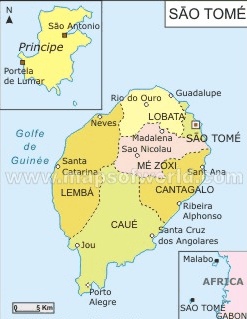|
KEY |
|
Topic |
|
CONTINENT |
|
Town |
|
|
|
|
|
|
|
EUROPE |
|
|
|
AFRICA |
|
|
|
|
|
ASIA |
The Children
of Sao Tome and Principe

In 1496 King Manuel wanted to colonize the islands of Sao Tome and Principe in order "to whiten the race" as he put it. For finance he imposed huge poll taxes upon the Jews to be paid within a short period. The Portuguese did not want to settle in the fever and crocodile infested islands.
It became clear that the majority of Jews could not pay the tax. To punish them no fewer than 2,000 children were torn from their parents and herded onto boats in Lisbon to be sent as slaves. This was reported by Rabbi Samuel Usque in his book "Tribulations of Israel". Within a year only 600 children remained alive. Usque recorded that when parents of children saw that the deportation was inevitable, they impressed on the children to keep the laws of Moses; some even married them off to each other.
A year after the children were left on the islands only 600 were found alive. Some children attempted to retain some semblance of their Jewish heritage and religion but by the 18th century most of the Jewish presence had perished.
A new community was established in the 19th and 20th centuries with the arrival of a few Jewish cocoa and sugar traders. Today there are no known practicing Jews living on the islands, but there remains a clear distinction in fair skin citizens, many of whom can trace their ancestry back to the Portuguese Jews.
Sao Tome and Principe eventually became one of the worlds leading sugar producers.
The islands obtained independence from Portugal on July 12th, 1975. In 1993 Israel's first Ambassador, Dr Moshe Liba, was warmly received there. He found that "the descendants of the child slaves were still a very distinctive section of the population ( because of their lighter skin), proud of their historic past and desirous of contact with Jews outside." Some Jewish customs had been maintained, although they are now greatly mixed with components of Creole societal values and cultural customs.
In order to commemorate the children who were torn from their parents in the 15th century, an international conference was held to coincide with the island's twentieth Independence Day, on July 12th 1995. Participants attended from Israel, the US, France, Holland, Portugal and Spain.
Notes;
1) Gloria Mound, "Continuing Jewish Customs and Folklore in Ibiza and Formentera".Proceedings of the Eleventh World Congress of Jewish Studies, Division D, Vol 11; Art, Folklore and Music (Jerusalem; World Union of Jewish Studies, 1994) 143 - 150.
2) Haim Shapiro, "Lies my Ancestors Told Me", The Jerusalem Post, August 19,1994, 10 - 12.